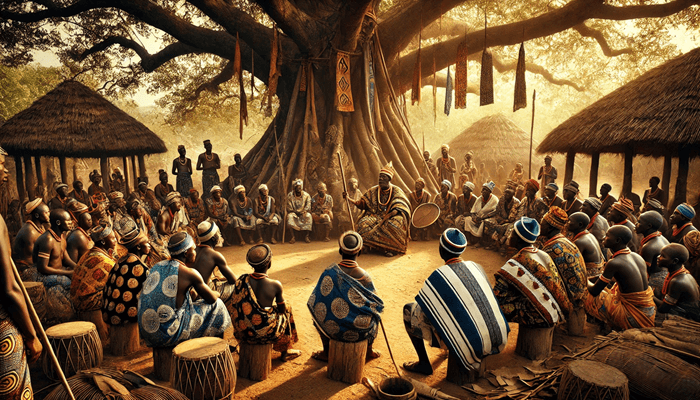A Seated Commemorative Sculpture From Nigeria To thought of an ancient monument, a monumental vessel embodying the will of a people who have been experiencing life intimately since the dawn of civilization. Based on customary law and oral history, this system has historically allowed for effective governance, social order, and dispute resolution among Igbo people. These include the Titles, Village Chief and Elders, Age-grades and Guilds, all crucial elements that keep Igbo society intact and undiluted.
The Political Structure
Descent, and community was far more important than the kingdom because Igbo political organization was a decentralized one. The villages exist as semi-autonomous communities, ruled by a council of leaders and institutions that personify participatory democracy.
Village Chiefs (Eze or Igwe)
The village head, called the Eze or Igwe, is not only a ceremonial and traditional head of the community but also the spiritual leader. Eze are not appointed by birthright, as in hereditary monarchies, so the role is most often awarded based on merit, wisdom, and leadership ability, although some lineages in some parts of the country are hereditary.
The Eze serves as a unifying figure, presiding over meetings at the community level, settling disputes between members and presiding over rituals that link the community to its ancestors and deities. His power isn’t absolute: he’s often a partner working with councils of elders and various other community institutions.
The Council of Elders
Among the Igbo, elders are respected, as age is appreciated for wisdom and experience. Essentially, decision-making often requires the wisdom of the council of elders, known as ndi ichie. These elders are often men (and sometimes women) who have earned respect in the community for their achievements.
The council considers disputes over land, differences in marriages, and communal projects. Consensus-building used to be how decisions were reached, a reflection of the Igbo tendency to prefer agreement to the dictates of a despot. They are also custodians of customs and tradition, to ensure that the younger generations follow what is considered the right part.
The Age-Grade System
Another pillar of the Igbo system of governance is the age-grade system (otu ogbo). Unlike our system, this is s a community-based system grouping individuals by their age rounded to the nearest five or ten-year cohort. Each age grade has duties, which change as members age.
- Youth Age Grades: Younger members are assigned physically intensive work like clearing and maintaining roads, constructing community buildings and providing security.
- Middle-Age Grades:The older members also take on greater administrative and organizational responsibilities, arranging festivals and overseeing community projects.
- Elder Age Grades: Older members then take on advisory roles, providing advice and mediating dispute resolution. As those who are typically beyond childbearing age, they are generally incorporated into the council of elders.
Based on the age-grade system, everyone shares in the responsibility, as each person contributes their own strengths to working for the good of the community.
Checks and Balances
Another aspect is the Igbo governance system, which enjoined a strong system of checks and balances. The Eze does not act autocratically, but his efforts are advised and moderated through the council of elders, the titleholding classes who control land and wealth, and the wider community. Open forums where the community members can express their views , are the vehicle for ensuring accountability and fostering inclusivity.
Societies such as the Ndi Nze na Ozo/titleholders also function partly as regulators, protecting tradition and taking action when leaders stray from community expectations.
Resolution of Conflict
Igbo society places great emphasis on dialogue and mediation when preparing for conflict resolution. Disputes are first brought up at the family level and, if that does not resolve them, brought to the elders or the Eze. This focus on rehabilitative as opposed to corrective justice reflects a communal approach to justice within the Igbo polity.
Importance in the Modern Era
Today, the principles of Igbo traditional governance remain evident, even amidst the broader influence of modern political systems and the pressures of urbanization. Some communities still respect the words of Ezes and councils of elders, mixing traditional customs with modern governance frameworks. It is this hybridity that enables the Igbo people to navigate modernity without forsaking their heritage.
An example is the Igbo traditional governance system which embodies a blend of democracy, communalism and accountability. The style of leadership is based on systems that comprise village chiefs, elders’ councils, and an age-grade system that ensures the leader is a reflection of the will of the people. Igbo communities are adapting to modernity, yet, traditional governance systems remain a vibrant source of identity and cohesion and even valuable tools in practicing participatory democracy and conflict resolution.
